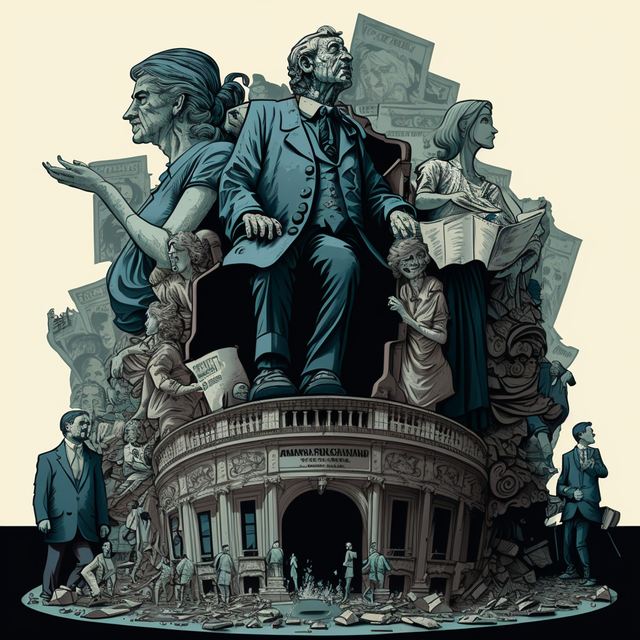Lobbying.
A practice in which interest groups, corporations, and individuals attempt to influence lawmakers and policymakers to enact policies that align with their interests, has become a contentious topic in recent years. Many argue that lobbying creates a breeding ground for corruption, as it incentivizes corporations to fund political campaigns in exchange for favorable policies that benefit their business interests. The East Palestine train derailment in Ohio is just one example of how lobbying can result in tragedy and harm.
The train derailment, which occurred in February 2023, was the result of railway companies lobbying politicians to forgo regulations that would have required them to update brake systems and provide safer working conditions for employees. The Serious consequences of this decision are left as a cross that the local community in East Palestine is forced to bare. These innocent people have to deal with the devastating implications much of which will be seen, but not be fully understood for years to come, at no fault to their own.
It's a sobering reminder of the cost of corruption and the destructive impact it can have on people's lives.
Unfortunately, the problem of lobbying is not limited to this single incident. Time and time again, we have seen how lobbying has led to a weakening of regulations that protect people and the environment. The pharmaceutical industry has also used lobbying to influence policies that prioritize their profits over the health of patients, resulting in skyrocketing drug prices, limiting access to life-saving medications, or worse loosening the regulations around drug safety which have resulted in numerous drug and vaccine injuries.
However, despite the clear harm caused by lobbying, some argue that politicians need the financial support of corporations and interest groups to run successful campaigns. This argument is not only flawed, but it's also dangerous. It suggests that politicians are beholden to their donors rather than their constituents and that the interests of corporations and wealthy donors are more important than those of ordinary citizens.
But what if we could change the system?
I’m certain the solution to this problem, much like everything else can be solved with tech.
I would like to create a platform that connects voters directly with political candidates, allowing them to learn about their policies and beliefs without the influence of lobbyists and big-money donors.
Imagine a platform similar in design to “youtube” but exclusively for all potential candidates and every candidate having a dedicated channel. It would be a platform serving as the primary location for candidates to answer questions, discuss policy/ policy reform, present their ideas, and connect directly with potential voters. The platform would also be designed to allow for interactive debates and town hall-style meetings, where candidates could engage with voters in real-time.
This isn’t to separate candidates from interacting with voters personally but instead, it would make the campaign process essentially free thus ensuring that all candidates have an equal opportunity to participate. This also allows voters to make decisions based on merit rather than then being limited by a candidates reach, a factor that relies on big-money donors or coming from money to establish.
The platform would be made free and accessible to all, regardless of their financial resources. In poorer areas, local libraries and community centers could advertise the platform and offer dedicated computers for voters to access it, and let’s face it with the majority of the population consuming their information from social media-based platforms anyway this sort of use case could be easily implemented and relatable to the common voter.
The platform would also be designed to allow for tagging, and an open source AI algorithm would help direct voters to candidates in their jurisdiction that aline most with their views or have certain issues in their campaign the voter is concerned with. This would help voters make more informed decisions.
The Open AI Source AI could also help with election integrity concerns. Allowing the public to see a real-time rate of preferred candidates and the most commonly aligned views in the area if all Voters used this designated platform to figure out who they want to vote for. The integrity of the platform could be maintained by keeping the tech open source and would need to be developed independently without government control.
All that being said, creating this platform is just the first step.
To truly eradicate the corrupting influence of lobbying, we must also disallow and criminalize all forms of lobbying.
By doing so, we would disincentivize corruption for both government and corporations, and ensure that our political system prioritizes the needs of ordinary citizens over the interests of big-money donors.
What would life in America be like if we were to take this step? We would have a political system that works for everyone, not just the wealthy and powerful. We would have cleaner air and water, stronger worker protections, and more affordable healthcare. We would have a government that is truly representative of the people, where politicians are accountable to their constituents, not their donors. Any politician that would take issue with this sort of implementation, you can rest assured there’s only one reason why. Let’s just say, what they truly have an interest in protecting, isn’t you.
The dangers of lobbying are clear. We have seen the harm that it can cause, and we cannot continue to allow our politicians to be the

prostitutes of corporate greed and institutional power.
What do you think about implementing something like this? Is it a good idea? A bad Idea? Why? What could be done to make it better?
Leave your thoughts in the comments below.
If you happen to be a web developer that might have an interest in helping me make a prototype I would also love to hear from you. :)